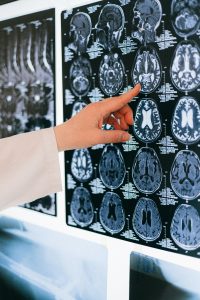 Obstructive sleep apnea (OSA) is a common condition that causes frequent pauses in breathing. An obstruction in the upper airway depletes oxygen levels, negatively affecting your general and mental health. Unfortunately, daily fatigue, headaches, and mood changes aren’t the only concerns of not seeking treatment. New research has found a connection between sleep apnea, memory loss, and brain damage. Here’s how sleep apnea therapy can keep your mind sharp and safeguard your health.
Obstructive sleep apnea (OSA) is a common condition that causes frequent pauses in breathing. An obstruction in the upper airway depletes oxygen levels, negatively affecting your general and mental health. Unfortunately, daily fatigue, headaches, and mood changes aren’t the only concerns of not seeking treatment. New research has found a connection between sleep apnea, memory loss, and brain damage. Here’s how sleep apnea therapy can keep your mind sharp and safeguard your health.
Sleep Apnea Linked to Brain Damage
Besides an increased risk of heart disease, diabetes, sleep deprivation, and many other serious health conditions, researchers at UCLA have discovered another danger linked to sleep apnea. They found it can contribute to the destruction of the blood-brain barrier, which protects the brain tissue from bacteria and infections.
Previous studies have found an increased risk of brain damage when the barrier is compromised. This can contribute to various serious health issues, like Alzheimer’s disease. Not to mention, the injury to the brain can have significant consequences for your mental health, increasing the likelihood of memory loss, decreased cognitive abilities, and depression.
Although further research is needed, brain damage from sleep apnea may be caused by reduced oxygen levels from repeated interruptions in breathing. Protecting your brain health is as simple as treating your sleep apnea.
Promoting Brain Health and Sleep Quality
You have multiple options to treat sleep apnea, depending on your needs and preferences, which include:
CPAP Machine
A CPAP machine is the most traditional method of treating sleep apnea. A gentle stream of air is delivered through a mask worn over the mouth or nose. The pressure prevents decreases in oxygen to protect your health while improving your sleep quality.
Oral Appliance
As an alternative to a CPAP, many patients prefer an oral appliance. A custom-made device is used to reposition your lower jaw and tongue. This prevents them from blocking the airway as your muscles relax. It’s an FDA-approved solution to keep your airway open. Patients with mild-to-moderate cases of OSA can see over a 90% improvement in their symptoms when worn consistently. An oral appliance can be used alone or along with a CPAP for maximum effectiveness.
Safeguard Your Brain Health
If you have signs of sleep apnea, don’t ignore them. Consult with your physician to confirm the diagnosis. Then, contact your sleep dentist to get the intervention you need with an oral appliance. They’ll create a personalized device from a durable, comfortable material. You won’t have to worry about any hoses or noises keeping you awake.
Don’t spend another night placing your mental health and wellness at risk. See if an oral appliance is right for you.
About Dr. West
Dr. West earned her dental degree at the University of Southern California before continuing her training in sleep medicine. She has completed extensive continuing education courses, earning her memberships with various professional organizations, including the American Academy of Sleep Medicine. If you are interested in an oral appliance, contact our office today to request your consultation for sleep apnea therapy.
